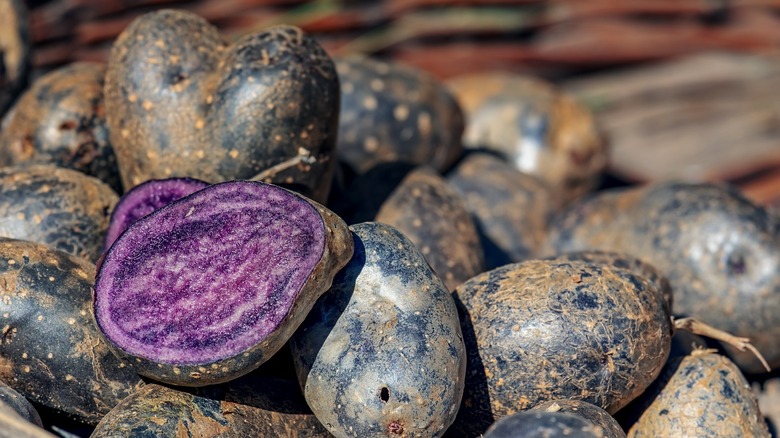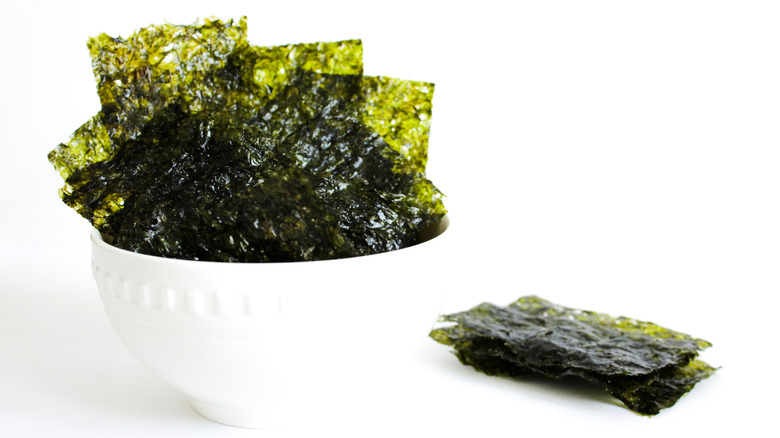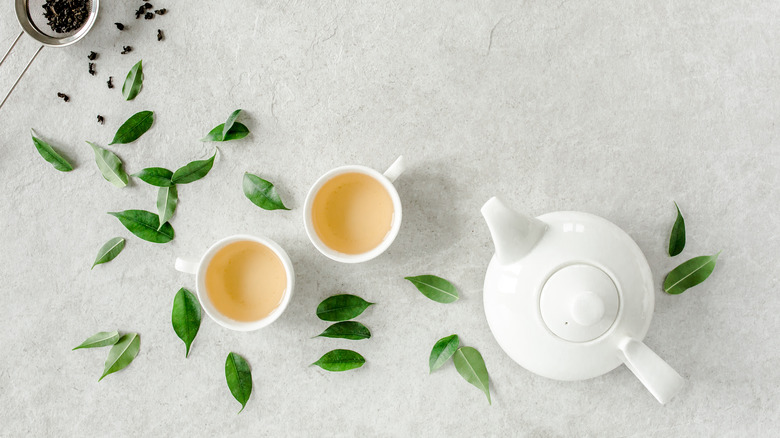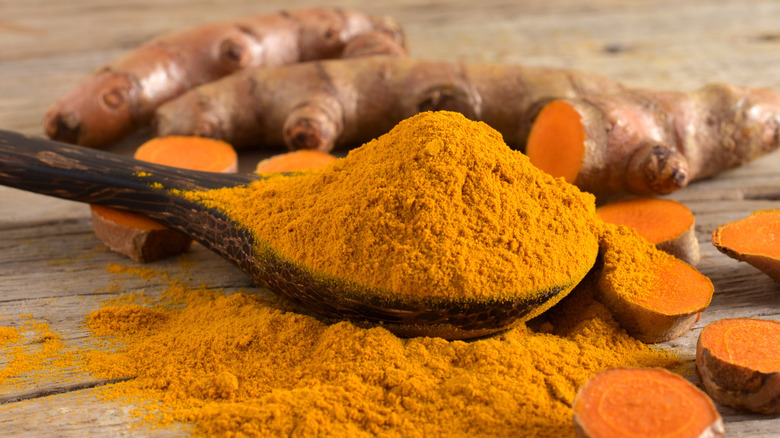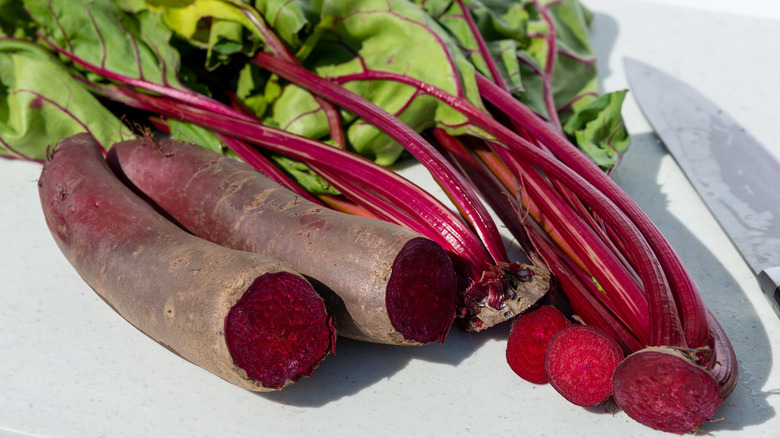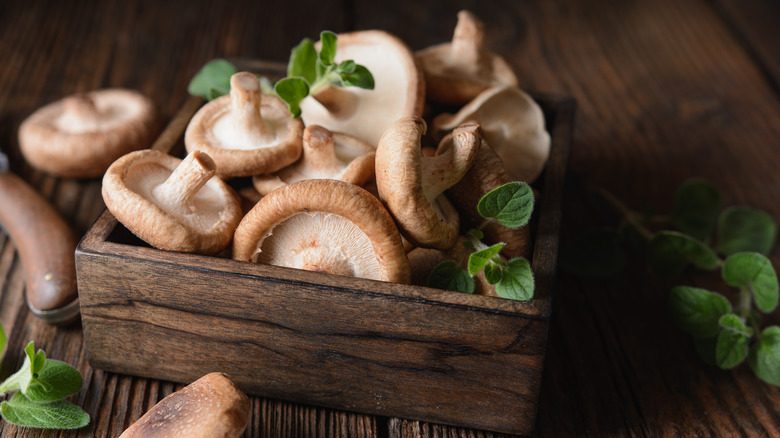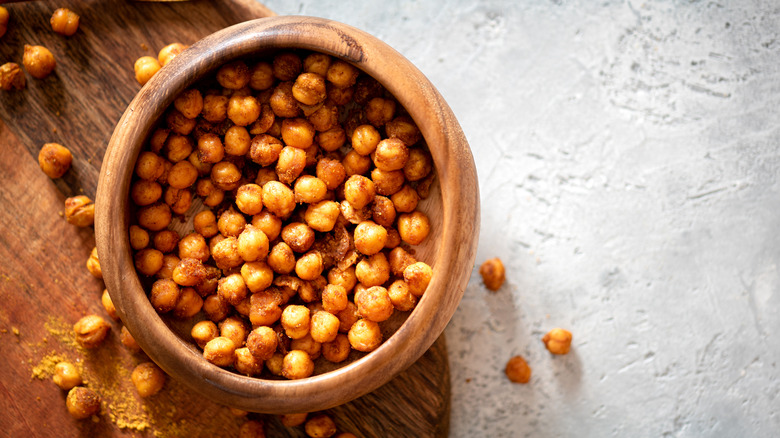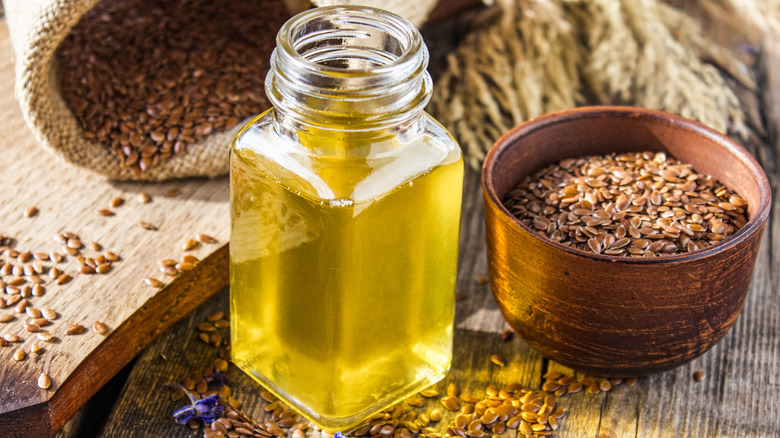Foods That Will Put You In A Better Mood
People have long turned to various substances to enhance their mood — from Prozac to alcohol to psychedelics. But some researchers, physicians, and nutritionists say that the answer to improved and sustainable mental health may lie in something as simple as our diet (via Antioxidants). Studies have shown that challenging emotions like stress and sadness can lead to eating foods that provide a sense of comfort and consolation (via International Journal of Gastronomy and Food Science). But equally, what we consume can have a subtle or even significant impact on how we feel.
Not only do different foods nourish and fuel our bodies, but they can have antidepressant-like properties that affect our brain health and emotional wellbeing, according to a review study from the World Journal of Psychiatry. Although the research on the connection between dietary factors and depression is still inconclusive (via Harvard Health Publishing), there are ample anecdotal reports and a growing body of evidence to suggest that certain nutrients can contribute toward the prevention and treatment of psychological disorders (via Antioxidants). It's often said that the western diet tends to be lacking in these nutrients, unlike the Mediterranean diet, which has an abundance of leafy greens and healthy fats. And while eating these foods may not immediately lift your mood, they can have an indirect role that makes a substantial difference in the long term. Here are some foods to squeeze into your diet if you want to alleviate the blues and promote a better mood.
Chocolate
Long touted as the "happiness drug," chocolate doesn't just put a smile on your face because it tastes yummy, says the Australian Academy of Science – it contains an assortment of chemicals that perk you up. Theobromine and phenylethylamine are mild stimulants found in cocoa that have an uplifting effect on your mood. The latter also happens to be one of the compounds released by your body when you fall in love, triggering that giddy and elated feeling.
Research shows that chocolate contains psychoactive ingredients that generate feelings of euphoria akin to getting high from marijuana (via American Chemical Society). According to a well-known study, dark chocolate contains small amounts of anandamide — the body's natural food-good chemical — which interacts with the same endocannabinoid receptors as tetrahydrocannabinol (THC) in cannabis. In fact, the name "anandamide" was derived from the Sanskrit word for "bliss," alluding to the pleasurable sensations it yields, per Acta Pharmacalogica Sinica.
A 2019 cross-sectional study from the journal Depression and Anxiety found that eating dark chocolate actually reduced clinical symptoms of depression. But chocolate makes us happy in other ways too. Cacao — the bean that chocolate is concocted from — is a legendary aphrodisiac rich in nutrients like magnesium (via HuffPost), which supports sexual function as well as brain and hormone health (via Healthline). A 2018 study from Food Chemistry contradicted previous findings that the roasting process destroys the nutrients of cocoa beans, demonstrating that roasting can help boost particular bioactive molecules that work on improving your mood.
Blue Potatoes
Blue potatoes may very well look like food for aliens. But this interestingly-colored, oddly-shaped vegetable might help alleviate another kind of blues. They contain anthocyanin pigments — a flavonoid that's responsible for their naturally blue or purplish skin and flesh, and which also provides potent antioxidant abilities, reports a 2019 study published in Molecules. Antioxidants inhibit or delay the oxidation process, preventing free radicals from damaging the cells in your body, and in turn, fighting off the formation of various diseases (via Harvard T.H. Chan School of Public Health).
A 2019 study found that dietary antioxidants can help bring down inflammation, which purportedly underlies many mental health disorders like anxiety and depression (per Antioxidants). An anti-inflammatory diet, therefore, is suggested to play a key role in the prevention and treatment of depression, per a 2019 literature review in Clinical Nutrition. Other nutrients that are packed into the skin of blue potatoes include iodine, which might have a positive effect on your mood by balancing your thyroid hormone levels, according to research from the Annals of Pediatric Endocrinology & Metabolism.
Although blue potatoes originate from South America, this delicious root vegetable is grown all around the world (via All About Potatoes). They generally taste very similar to other types of potatoes — their color doesn't give them a special flavor — and are cooked in pretty much the same way. But unfortunately, they tend to lose their vibrant color in the cooking process.
Leafy greens
Eating a diet rich in leafy greens like spinach, kale, and swiss chard is known to bump up your health in a wide variety of ways (via Healthline). But these greens are also associated with fewer depressive and anxiety symptoms due to their high content of antioxidants, according to a 2018 study published in Frontiers in Psychology. There's evidence that dark leafy greens are some of the best plant-based sources of tryptophan (via SELF Nutrition Data) — an amino acid that contributes toward shoring up serotonin levels in your brain. Serotonin is your body's main feel-good chemical that helps regulate mood and sleep, as well as warding off depression, per research from the journal World Psychiatry. Low serotonin has long been associated with depression, anxiety, and various other mental and physical health problems, which is why many traditional antidepressant drugs are designed to raise serotonin levels.
Leafy green vegetables are also an excellent source of folate, a naturally occurring form of vitamin B9 which is also said to stimulate serotonin production — many studies have found a strong relationship between folate deficiency and depression (via Journal of Psychiatric Research), with earlier research suggesting that combining folate and antidepressants may help increase treatment efficacy (via the Journal of Clinical Psychology).
Seaweed
Seaweed doesn't merely serve as food for aquatic life — this highly nutritious marine alga has been celebrated for its health benefits for centuries (via BBC News). Raw seaweed is particularly abundant within East Asian cuisine, where it's used in salads, soups, and sushi. While the research on the relationship between seafood and mental health remains sparse, scientists are slowly discovering more about how it can help improve your mood, with a 2019 study of Japanese adults revealing a lower incidence of depression among those who include more seaweed in their diet (via Nutrition Journal). The study authors attribute these results to the "many nutrients contained in seaweed, including folate, vitamin B6, vitamin B12, and n-3 polyunsaturated fatty acids." Folate and vitamins B6 and B12, in particular, help maintain healthy levels of monoamine neurotransmitters like serotonin and dopamine in the brain.
Seaweed also makes for an excellent source of prebiotic fiber, notes a 2020 review study from the journal Molecules. It helps increase the beneficial microbes living inside the gut, which is now understood to be an important part of physical and emotional health — so much so that it's sometimes referred to as the "second brain" by researchers (via Frontiers in Psychology). Prebiotic therapy has been used to effectively treat both anxiety and depression, details a 2019 systematic review from the journal BMJ Nutrition, Prevention & Health. It's been hypothesized that this stems from the fermentation of prebiotics by probiotics, which leads to the formation of short-chain fatty acids that trigger serotonin in the brain (via Eat2BeNice).
Green tea
Green tea, which comes from the plant Camellia sinensis, has a number of different mood-boosting compounds, says a 2017 review study. It contains a small amount of caffeine that gives your brain (and mood) a kick, but the amino acid known as L-theanine also helps keep your blood sugar levels in check, reducing that jolt and crash effect people usually get from coffee (via Healthline). A 2016 study published in the journal Nutrients found that people who consumed 200 milligrams of l-theanine had lower levels of the stress hormone cortisol, and generally reported feeling more relaxed after completing stressful tasks compared to subjects who took a placebo. The calming effects of green tea are attributed to the combination of both caffeine and l-theanine together, notes the aforementioned study from the journal Phytomedicine, since people tend to respond differently to these substances when they consume them separately. The uplifting effects of green tea can't be pinned down to just one component, conclude the researchers.
Another ingredient in green tea that's been linked to a better mood is the antioxidant known as epigallocatechin gallate (EGCG). A study from the journal Appetite revealed that people generally experience less "psychological distress" after having EGCG. The study participants also demonstrated an overall increase in alpha, beta, and theta brain activity, the combination of which is associated with a more "relaxed and attentive state."
Coffee
Most people are probably familiar with that caffeine-induced buzz. Research has consistently shown that a cup of joe can improve various aspects of brain function, including memory, learning, and mood (via the Journal of Alzheimer's Disease). But the "biphasic effect" of caffeine means that consuming too much can also send you crashing down, resulting in jitteriness and nervousness (via Cambridge University Press). Dosage is certainly important when it comes to its mood-enhancing abilities, and avid coffee drinkers may not experience the same effects, states a review study from the journal Molecular Nutrition & Food Research.
A 2020 review shed light on coffee's status as a mild antidepressant, revealing that it can reduce depression by more than 30%. "Evidence shows that coffee drinkers are significantly less likely to be depressed than people who do not drink coffee," said Alan Leviton, the study author and professor of neurology at Harvard Medical School, as noted by the National Coffee Association. Once again the antioxidant, anti-inflammatory, and microbiome-promoting characteristics of caffeine are credited for their stress-relieving qualities. Based on research findings, caffeine helps lift up your mood by stopping receptors in the brain from attaching to a chemical called "adenosine," which triggers feelings of fatigue and malaise.
Red wine
It's unlikely to come as a surprise that red wine could be an elixir for happiness. Not only does its alcohol content lend itself to a pleasurable experience, but it's brimming with antioxidants, including flavonoids, polyphenols, and resveratrol, explain researchers (via Molecules). Red wine has been enjoyed for its health benefits for thousands of years, and studies have shown that drinking a certain amount each day may help reduce your risk of various chronic diseases. The plant compound resveratrol, in particular, has high antioxidant and anti-inflammatory potential; it crosses the blood-brain barrier and protects the brain and nerve cells by neutralizing free radicals.
A 2019 study from the journal Neuropharmacology reinforces the anti-stress and antidepressant-like property of red wine, which is, in part, due to its inhibition of the enzyme phosphodiesterase 4 that has been linked to the development of depression and anxiety. "Resveratrol may be an effective alternative to drugs for treating patients suffering from depression and anxiety disorders," Ying Xu, the co-lead author and a research associate professor at the UB School of Pharmacy and Pharmaceutical Sciences, told the University of Buffalo. The study has been said to provide some exciting groundwork for understanding how resveratrol may be used in the development of antidepressant medications in the future.
Turmeric
Love it or hate it, the benefits of turmeric have been lauded for many years now — and science is now revealing more and more about this pungent plant. Its most familiar form is as a powdered spice, which is a common staple used in various types of cuisine including Indian, Southeast Asian, and Middle Eastern (via WebMD). It's remained popular since ancient times, and used medicinally in Ayurveda — a traditional medicine system with roots in India (via Healthline) — for thousands of years to treat inflammation, rheumatoid arthritis, infections as well as cancer.
Like a lot of vibrant foods, turmeric's distinct yellow hue signals its health-promoting potential. It gets this almost-luminous color from a unique active molecule called curcumin, details a 2020 review published in Frontiers in Psychiatry. Curcumin is believed to improve both anxiety and depression by affecting monoamine levels in the central nervous system and increasing mood-related neurotransmitters like norepinephrine, serotonin, and dopamine. Curcumin might also work its magic by blocking the production of pro-inflammatory compounds called cytokines. A recent meta-analysis from Critical Reviews in Food Science and Nutrition lent further support to the depression and anxiety-busting powers of curcumin, emphasizing that the compound has been shown to successfully treat a variety of neuropsychiatric disorders including major depressive disorder.
Beets
Nothing beats the mood-elevating properties of beets. Alongside a medley of essential nutrients, this superfood is dense with essential vitamins and minerals (via Los Angeles Times). Beets are even richer in potassium than bananas (via Prevention). Low levels of potassium have been consistently associated with greater rates of depression and other mood disorders (via Livestrong). Indeed, research findings from the British Journal of Nutrition found that a diet high in potassium could help alleviate depressive symptoms and tension in participants, reinforcing the electrolyte's potential in the treatment of mood disorders. An earlier study published in Nature Neuroscience showed that potassium provides an electrical charge that facilitates the use of serotonin, ensuring that your brain produces a sufficient supply of the happy hormone.
The burgundy root vegetable is also brimming with manganese (via SELF Nutrition Data) — another microelement that can result in depressive disorders when consumed either deficiently or in excess, explains a research article from Current Issues in Pharmacy and Medical Sciences. Beets are also loaded with folate, a naturally occurring form of vitamin B9, which can fend off the blues in a number of different ways, according to the World Journal of Psychiatry. Studies have shown that people with depression generally display lower levels of folate than non-depressed people, and that combining folate supplementation with traditional antidepressant medication may help bump up the effectiveness of treatment (via the Journal of Psychiatric Research).
Blueberries
Blueberries are off-the-charts in antioxidants, making them a highly popular superfood, notes research (via Advances in Nutrition). Their capacity to protect your brain and body from cell-damaging free radicals means they can boost your health in a wide variety of ways (via Healthline). A bit like blue potatoes, blueberries get their unique blueish color from natural anthocyanin pigments (via Current Opinion in Food Science). Researchers have drawn a strong link between anthocyanins — a member of the flavonoid family — and better overall mental health. A recent 2020 study in the British Journal of Nutrition showed that adolescents who consumed blueberry supplementation containing 253 mg anthocyanins reported significantly fewer symptoms of depression, while an earlier 2017 study published in the journal Nutrients found that drinking a flavonoid-rich blueberry beverage had a positive impact on mood in children and young people.
Alongside their antioxidant effects, it's suggested that the neuroprotective perks of anthocyanins may result from their positive impact on gut microbiota (via Journal of Functional Foods). Additionally, like a number of other mood-elevating foods, the anti-depressant activity of anthocyanins can also be understood in terms of its capacity to increase monoamine neurotransmitters, ensuring that the central nervous system has adequate levels of serotonin, norepinephrine, and dopamine, all of which are key players in mood regulation. The science definitely appears to suggest blueberries are an ideal go-to fruit if you're feeling a bit down.
Shiitake mushrooms
It turns out that psilocybin — the psychedelic "magic mushroom" — isn't the only mushroom that can be used for medicinal purposes. Shiitake mushrooms are packed full of zinc (via My Food Data), a mineral that's been consistently linked to mood and depression. A large concentration of zinc can be found in the hippocampus, a region of the brain that's involved in emotion processing and social cognition, as reported by a review study published in Neuroscience & Biobehavioral Reviews. A lack of zinc has been shown to result in various psychological ailments including depression, ADHD, as well as learning and memory problems (via Pharmacological Reports). According to a 2020 meta-analysis, Zinc has the potential to alleviate and lower your risk of depression, either when used as a supplement or as a monotherapy.
But shiitake mushrooms can put a smile on your face in other ways too. A classic aphrodisiac, this earthy-flavored East Asian food has been said to drive up libido, based on the findings of a 2021 study published in the Journal of Sex and Marital Therapy. Zinc supplementation was found to improve testosterone levels, sexual desire, and overall sexual function in postmenopausal women. Zinc deficiency, on the other hand, can cause a host of sexual problems including low testosterone and erectile dysfunction in men, which is likely to put a huge dent in your mood (via Healthline).
Chickpeas
Chickpeas, also called garbanzo beans, are a popular food in India and the Middle East (via WebMD). While you might be aware of their high nutritional content, what a lot of people don't know is that chickpeas contain an essential nutrient called choline — also present in egg yolks, soybean, wheat germ, and peanuts — which helps your body produce vital chemicals that aid mood, memory, and brain and nervous system function (via University of Rochester Medical Center). Research has even shown that moms-to-be can reduce the chances of their offspring developing mental health problems by taking choline supplements. In a 2013 study from the American Journal of Psychiatry, babies born to women who received 900 milligrams of choline a day (equivalent to approximately three large eggs) while pregnant exhibited better development of cerebral inhibition than those whose mothers didn't take the supplements.
Like a number of other serotonin-stimulating foods, chickpeas are stacked with the amino acid tryptophan — a precursor of serotonin — explains scientists (via the International Journal of Tryptophan Research). Serotonin shoots signals between brain cells, acting as a neurotransmitter whose main job is to regulate our mood and keep us from falling into a dark pit. Most modern anti-depressant medications like Prozac and Zoloft (via Mayo Clinic) — namely, selective serotonin reuptake inhibitors (SSRIs) — operate by increasing serotonin levels in the brain, reports the Journal of Psychiatry & Neuroscience, which has led some researchers to hypothesize that chickpeas' antidepressant properties may be why they were so popular in ancient cultures.
Oats
A warm bowl of oatmeal makes for a comforting and hearty breakfast. Oats also happens to be one the healthiest grains on earth, laden with revitalizing nutrients like fiber, magnesium, manganese, and phosphorus (via Healthline). Thiamin — also known as thiamine or vitamin B1 — is a mood-lifting vitamin that's packed into each flake (via Healthline). A deficiency, while rare, can lead to various psychological issues like anxiety and depression. A 2016 study found that thiamine supplementation helped ease symptoms in young patients with major depressive disorder over a six-week period at the initial stages of therapy. The authors conclude that thiamine may help accelerate the efficacy of antidepressant treatment.
What's more, raw oats are comprised of 66% carbs, 11% of which is fiber, per Healthline. A bowl of oatmeal can help pick up your mood by balancing your blood sugar levels and preventing a spike or dip, which could lead to irritability, restlessness, and fatigue (via Medical News Today). They also help keep your body feeling full and satiated for longer, avoiding a potential energy crash and a craving for more food — which is always a good way to keep the spirits high.
Bananas
Bananas are a popular food to snack on when you're feeling peckish. But there may be another reason why people are frequently turning to this tasty and convenient fruit. Research from the Pakistan Journal of Pharmaceutical Sciences shows that bananas have anti-anxiety, antidepressant, and memory-enhancing effects, possibly due to their antioxidant enzymes and numerous other nutrients (which might explain why monkeys are always so happy).
Though predominantly grown in warm countries across Asia, Latin America, and Africa, bananas are available pretty much all around the world, as reported by the Food and Agriculture Organization of the United Nations. They're loaded with potassium, magnesium, and vitamins A, B6, and C — all of which can play an important role in decreasing stress and bettering your mood (via WebMD). Bananas also contain the amino acid tryptophan (via WebMD), which the brain converts to 5-HTP, a molecule that helps produce serotonin and melatonin (via World Psychiatry). These naturally soothing chemicals help you sleep and feel better as well as reducing your risk of depression, explains a study from The Scientific World Journal.
Walnuts
This brain-shaped nut is said to contain a rich variety of mood-bolstering micronutrients. In a 2019 study from the journal Nutrients, researchers identified an association between walnut consumers and lower rates of depression. Conducted with a U.S. population sample, the study found that people who indulged in more walnuts had far fewer and less frequent depressive symptoms, and expressed "greater interest in activities, higher energy levels, less hopelessness (among women), better concentration, and greater optimism." The results were particularly notable among women.
Unlike other tree nuts, walnuts are high in alpha-linolenic acid (ALA). This essential omega-3 fatty acid has been shown to reduce inflammation, and is fairly effective in the treatment of mental health disorders like depression, as noted by a review study published in Integrative Medicine Research. The rich polyphenol content of this super nut also sets it apart from other tree nuts (via Healthline). Like other anti-inflammatory and antioxidant compounds, polyphenols may help relieve depression by promoting the cultivation of friendly bacteria in the gut, suggests a 2019 review from Frontiers in Neuroscience. Research on the "brain-walnut connections" confirms "that walnuts have an unusual pattern of fatty acids, fiber and polyphenols that do affect the microbiome," which in turn acts on our mood and helps us feel better, said Lenore Arab, professor at the UCLA David Geffen School of Medicine, per Healio.
Flaxseeds
Like walnuts, flaxseeds contain the happiness-promoting alpha-linolenic acid (ALA) — in fact, this wonder food is considered one of its richest sources (via Cleveland Clinic). Often consumed in its oil form, flaxseeds have a potent dose of protein, potassium, lignans — a powerful phytoestrogen — and soluble and insoluble fibers. Flaxseed oil supplementation has been shown to improve the mood of women with depression, as well as increasing the brain-derived neurotrophic factor level — a protein that's been implicated in mood disorders and stressful situations — claims a review study from the 2020 edition of International Journal of Food Properties.
It's been speculated that flaxseeds might also have a positive effect on mood due to their hormone-balancing benefits. Specifically, lignans help regulate estrogen levels, preventing it from increasing too much in the body, says research from Frontiers in Nutrition — the emotional effects of estrogen have been long documented, including its possible role in the onset of depression and anxiety (via WebMD).



